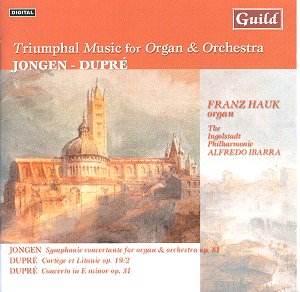Joseph JONGEN (1873 - 1953)
Symphonie Concertante Op.81 (1926)
Marcel DUPRÉ (1886 - 1971)
Cortege et Litanie Op.19 No.2 (1921)
Concerto in E minor Op.31 (1928)
 Franz Hauk (organ)
Franz Hauk (organ)
Ingolstadt Philharmonic/Alfredo Ibarra
Recorded: Ingolstadt Munster, August 1997
 GUILD MUSIC GMCD
7195
[67:52]
GUILD MUSIC GMCD
7195
[67:52]
Crotchet
AmazonUK
AmazonUS
Amazon
recommendations

Joseph Jongen was the most important musical personality of his generation
in Belgium. Pianist, organist, conductor and teacher, he was first and foremost
a most distinguished composer who wrote in almost every genre. His large
and varied output (over 130 opus numbers) includes a number of works for
organ of which Chant de mai and Sonata Eroica are probably best-known to
organists. However his masterpiece is the wonderful Symphonie Concertante
Op. 81 for organ and orchestra completed in 1926. It is also his most recorded
work, though it is still rarely heard in concerts. (I for one have attended
two live performances in thirty years!) The piece is written on a large scale,
in four substantial movements playing for over half an hour. It opens with
an impressive Allegro that begins fugally and later develops a tightly knit
symphonic argument. The second movement Divertimento is a delightful Scherzo
which at times has folk-like rhythms. The heart of the symphony is the beautiful
slow movement Molto lento, a long meditation of great depth and of remarkable
harmonic subtlety. The symphony's last movement is a brilliantly scored,
energetic Toccata providing for a rousing conclusion. Eugene Ysaye attended
the first performance in Brussels in February 1928 and a few days later he
wrote Jongen a characteristically friendly and perceptive long letter, quoted
in full in Hauk's insert notes. Ysaye obviously got to the heart of the Symphonie
Concertante and there is indeed nothing to add to his remarkably illuminating
comments. He too believed that Jongen had put all his best musical thoughts
and his heart into this magnificent masterpiece. For many years the best
recorded performance available was that by Virgil Fox with the Orchestre
de l'Opera de Paris conducted by Georges Prêtre (originally issued
by CAPITAL RECORDS, then re-issued as ANGEL S-26894 and, later still, re-issued
in CD format [EMI CDM 5 65075 2] possibly still available). A more recent
recording was that by Michael Murray with the San Francisco Symphony Orchestra
conducted by Edo de Waart (TELARC DG 10096 published in 1985) which was splendid.
Now, as far as I am concerned, I find the present performance second to none,
even if Hauk and Ibarra give a more relaxed reading of the Scherzo and have
a more expansive approach of the slow movement (14'20 compared to Fox's 12'26).
However, the present performance is beautifully poised and never sluggish,
with finely judged tempi.
Marcel Dupré was a remarkable organist and a very fine composer
too who wrote extensively for his instruments. His music for organ also includes
several works with orchestra or instrumental ensemble. Cortege et Litanie
Op.19 No.2, a reworking of some stage music, is one of them. This short piece
is superbly crafted and is a fine example of the somewhat lighter side of
Dupré's music. By contrast, the Concerto in E minor Op.31, completed
in 1928, is a substantial work, cast in the fairly traditional fast-slow-fast
pattern. However Dupré's approach to the medium is highly personal
and he succeeds in blending organ and orchestra in a masterly manner. The
first movement opens boldly, then presents three main subjects that make-up
for most of the ensuing development. The slow movement has a folk-like second
subject contrasting with the chorale-like first one. The last movement is
again a brilliant Toccata culminating in a grandiose apotheosis. A major
work by all counts. Both Cortège et Litanie and the E minor Concerto
are available on NAXOS 8.553922 (Volume 3 of their on-going Dupré
series) in excellent performances by Daniel Jay McKinley with the
Columbus-Indiana Philharmonic conducted by David Bowden. (This CD also includes
Poème héroïque Op.33 and the Symphony in G minor Op.25,
and I hope that these pieces will also be recorded by GUILD in the not-too-far
future.) Again Hauk's and Ibarra's readings are very fine indeed, so that
- in the present instance - the decision turns on the coupling.
The recording team has again coped quite successfully with the reverberating
acoustics of Ingolstadt Munster.
To sum-up, excellent performances of magnificent pieces in a very warm and
natural recorded sound, and one of the finest CD's of organ music I have
heard recently. Unreservedly recommended.
Hubert Culot

